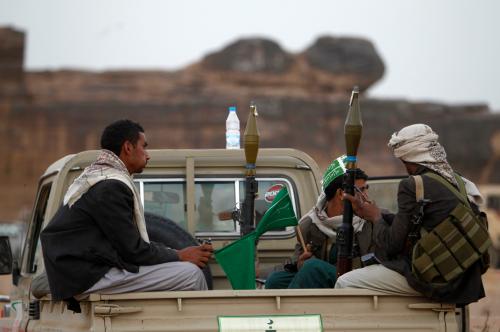Terrorism, it is often said, is the “weapon of the weak”. Groups that
cannot win in conventional war use un-conventional means to strike terror
behind the battlelines. Increasingly, however, the truly “weak” of society,
specifically children, have been pulled into terrorism as targets and
participants. The “soft” security issue of children has become one of the
grimmest aspects of the “hard” issue of terrorism.
Despite global consensus against sending children into battle, there are
300,000 children under 18 (boys and girls) serving as combatants in almost
75 per cent of the world’s conflicts; in 80 per cent of these, there are
child fighters under 15, and in 18 per cent, fighters of less than 12 years
old. It is no surprise therefore that, as on the world’s battlefields,
children are increasingly present in terrorist groups. Children offer
terrorist group leaders cheap and easy recruits who provide new options to
strike at their foes.
The fact that one of the first US servicemen to die in Afghanistan was shot
by a 14-year-old sniper was little discussed in the media. US troops
continue to face child soldiers in Afghanistan, the youngest on record
being a 12-year-old boy captured in 2004 after a Taliban ambush. Equally,
in Iraq, coalition forces are contending with the involvement of children
in conflict. During the invasion that toppled Saddam Hussein’s regime,
American troops engaged Iraqi child fighters in at least three cities. The
trend has grown during the insurgency with children serving as everything
from snipers to front-line fighters in the fighting in Falluja.
Perhaps the most disturbing aspect of contemporary terrorism is the
escalation of suicide bombing. Here, too, children are present. Groups such
as Palestinian Islamic Jihad and Hamas have recruited children of 13 to be
suicide bombers and as young as 11 to smuggle explosives and weapons.
Youths have conducted more than 30 suicide bombings since the
Israel-Palestine conflict revived in 2000.
Neither terrorism nor children’s roles in it are a uniquely Muslim
phenomenon. The Real IRA, a coalition of dissident IRA terrorists in
Northern Ireland, began recruiting boys in the 14-16 age range in the late
1990s. Other examples range from Colombia, where the youngest reported
terrorist was a nine-year-old boy sent by guerrillas to bomb a polling
station in 1997, to Sri Lanka, where terrorists have used child suicide
bombers.
In the war on terrorism, we are not simply facing groups of bearded men
hiding in caves. To defeat terrorist groups we must deny them child
recruits. It is essential to shrink the pool of potential resources and end
terrorists’ ability to access it. Underlying problems of hopelessness often
lead children (and even their parents) to believe they have no better
future than joining terrorism and its likely outcome of an early death. As
Fadl Abu Hein, a psychology lecturer from Gaza, notes: “Martyrdom has
become an ambition for our children. If they had a proper education in a
normal environment, they won’t have looked for a value in death.”
Focusing solely on the leadership of terrorist organisations is not enough;
it misses the larger socio-economic context that enables their recruiting
techniques. An equally pressing problem is the environment of violence,
humiliation and lack of opportunity that surrounds many children in
troubled regions. This is heightened by failing education systems and
economic stagnation across many parts of the world. Change these and we
begin to change the present trends of terrorism.
Child terrorism does not happen through the spontaneous choice of the
children themselves. We must undercut the institutions that assist
terrorist groups in mobilisation and recruitment. Measures include
enlisting religious leaders to speak out against the use of children;
building up state school systems as an alternative to the private religious
schools of hate to which poor parents are often forced to send their
children; shutting down payment plans that reward suicide attackers and
their kin; and holding not only leaders but also families responsible for
their children’s actions in order to create accountability beyond the
child.
In battling against terrorist groups, we cannot simply hope to shame the
shameless who think it acceptable to send a child to do their dirty work.
But it is possible to make their job harder, undermine their support and
eliminate their recruitment pipeline.
The Brookings Institution is committed to quality, independence, and impact.
We are supported by a diverse array of funders. In line with our values and policies, each Brookings publication represents the sole views of its author(s).



Commentary
Op-edTerrorists Must Be Denied Child Recruits
January 20, 2005